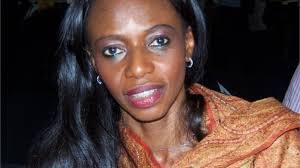By Andrew Warshaw. chief correspondent
October 31 – The head of Sierra Leone football has painted a grim picture of the devastating effect the Ebola crisis is having on the sport back home, with a fanatical football nation in lockdown domestically and forced to play internationals overseas.
Isha Johansen, one of only two active female presidents of a national federation, is playing a key role in spearheading the fight to prevent the epidemic spreading, using football, under the slogan “Kick Out Ebola”, as an instrument for gaining wider global recognition of the deadly virus that has struck at the heart of three west African states and has so far killed over 5,000 people.
In an interview with InsideworldFootball, Johansen, who took over as president of the Sierra Leone FA last year, revealed the shocking reality of living with Ebola on a daily basis and the impact it is having on players and fans alike.
“It’s frightening,” said Johansen, “not least the psychological toll. You are fighting an enemy you cannot see. We’ve been through a brutal civil war but at least you knew how to identify the enemy.
“All football activity has come to a grinding halt and that includes open-air public gatherings to watch games on giant screens, part of our culture. Africans love to hug each other but all of that has stopped.”
“Football is almost a second religion and I don’t make that statement loosely. Almost every market woman trader has a son, a brother, a father who is affiliated to a top European club, mainly in the English Premier League. They can reel off the names of the players and everything about the club but right now the priority is to survive.”
As long as Ebola is around, the stigma surrounding Sierra Leone football – and all sport in the country for that matter — will never wane. Barred from playing on home soil, the Leone Stars play all ‘home’ internationals overseas, consisting entirely of foreign-based players and foreign-based technical teams.
Hopes of qualifying for next year’s African Cup of Nations are already in tatters as is any chance of developing fresh talent.
“It’s just horrible,” said Johansen. “We recently had a ‘home’ game in Congo which was gruelling. The guys had to travel for around 50 hours. Then there is the fact that our fans can no longer watch the national team here, or any of those big names coming to their country.”
Living in constant fear of Ebola, Johansen has some sympathy with Morocco’s demands to shelve the African Nations Cup which it is due to host in January. “It’s unfortunate but if I were in their position I’d be looking at saving lives. It’s a valid fear. Who’s to say we would not have acted the same way if we were ebola-free? Am I worried that the tournament may not happen? Yes I am. It’s a really tricky one because it’s now on the political as well the footballing agenda. But like everything in life, if you haven’t felt it you don’t understand the magnitude of it.”
From a football standpoint, Johansen says there only so much she can do to help. “Pregnant women are dying because of lack of medical facilities. We need to raise much more money – and I’m already thinking about a charity event, maybe in England. But as an FA, we can only be a part of the solution.”
As such, Johansen is already using a chunk of money donated by FIFA to collaborate with Unicef in a programme to drive the charity’s social awareness and sanitisation campaign on the ground, advising the population – many of whom can neither read nor write – how to avoid contracting Ebola and how to identify the first signs of infection.
Women and children are particularly vulnerable, says Johansen, who is helping Unicef target primitive areas where sanitisation is low and hygene poor.
“I still don’t know all the answers but just as with our recent civil war woman and children are the ones most at risk,” Johansen explains. “Unicef are used to dealing with epidemics of this nature hands-on, helping to spread the word and telling people what to do and what not to do. At the end of the day you save lives by prevention.”
As one of only two current female FA presidents worldwide – the other is Sonia Bien Aime of Turks and Caicos – the British-educated Johansen, whose football background is in youth development, took over the presidency at the Sierra Leone FA somewhat controversially 15 months ago when several other candidates were disqualified.
Being a woman as well as owner of one of Sierra Leone’s leading clubs, FC Johansen, she admits she has suffered discrimination since taking on the role of running the national federation.
“I’ve certainly suffered verbal bullying, in fact some of the worst things imaginable have been said about me. Whether it’s because of my gender or my zero tolerance towards corruption and mismanagement, I can’t say. I never set out to go down this path but I saw the massive changes that needed to be made. Without being condescending, I didn’t see any of the other contenders bringing that about.”
“I’m not saying I’m the answer to Sierra Leone’s woes but I do know I have what takes to bring about integrity and credibility. It’s just a shame Ebola has stopped us in our tracks somewhat but I’m doing what I can.”
Contact the writer of this story at moc.l1744330282labto1744330282ofdlr1744330282owedi1744330282sni@w1744330282ahsra1744330282w.wer1744330282dna1744330282

